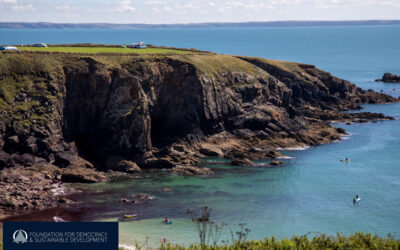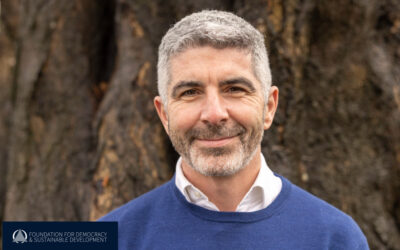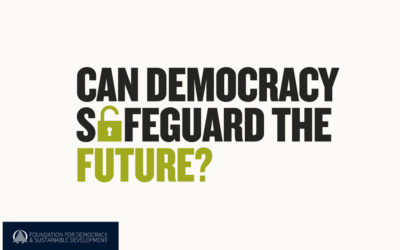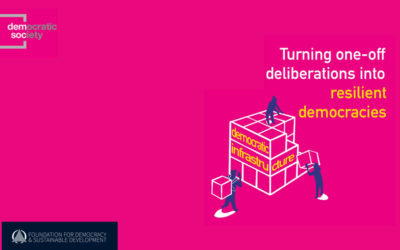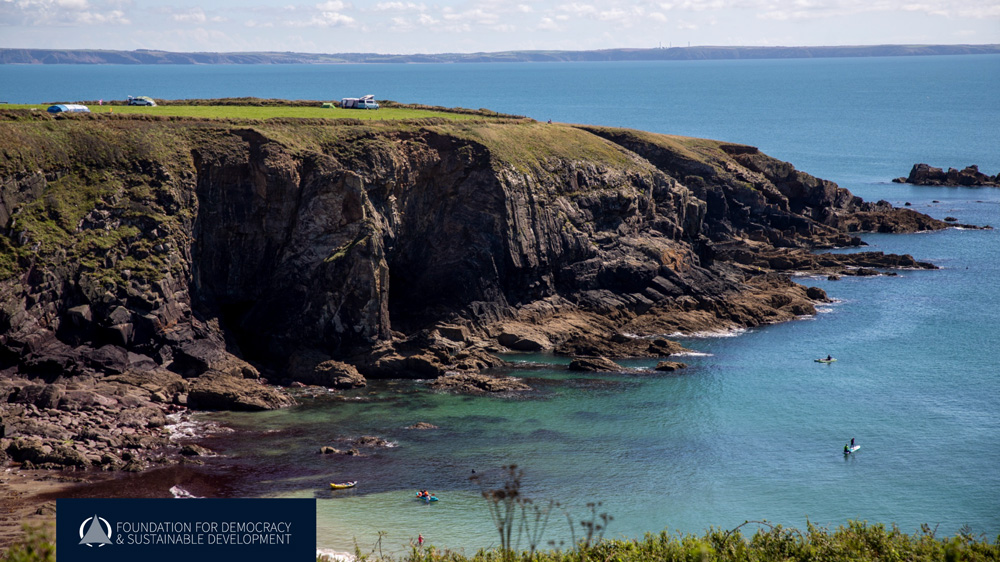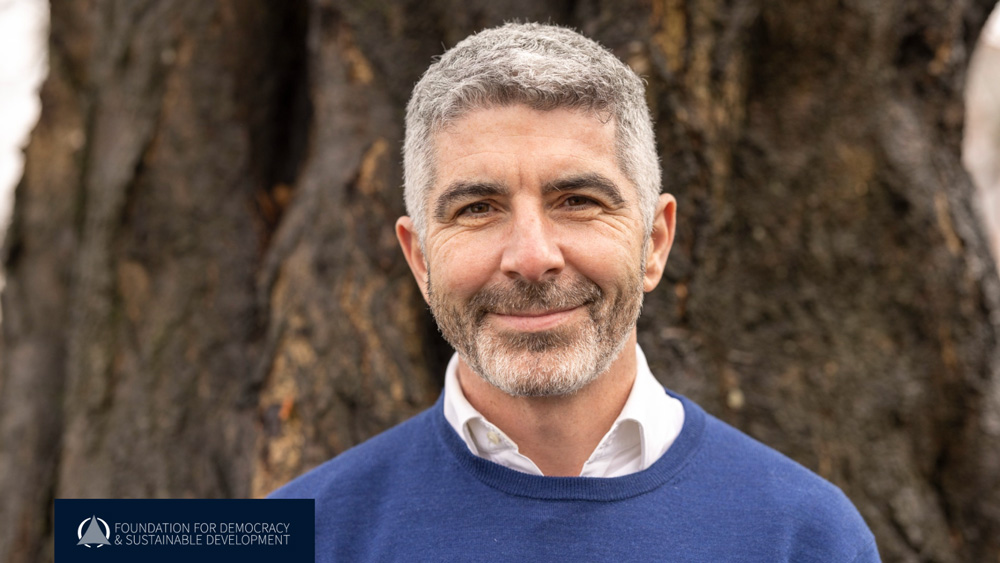
FDSD is a UK-based think tank that explores and helps build the relationship between flourishing democracy and sustainable development. Our work takes three forms:
- Research. We identify, document and share governance innovations to support the development of practical solutions.
- Advocacy. We gather the evidence, and make the connections, needed to advocate for political reform and institutional change.
- Dialogue. We convene multi-stakeholder forums, and open spaces for dialogue, to change a climate of thought and shape policy and practice.
Across all our streams of work, we help to develop the tools and tactics needed to equip people, organisations and governments to better think, plan and act for the long term. We produce reports and briefings, and commission short pieces or provocations to stimulate debate, and suggest solutions. We respond to national and international consultations, and raise issues directly.
Our Team
The Foundation for Democracy and Sustainable Development is led by a group of trustees who are also directors of the company. Associates bring their knowledge, skills and experience to help us take forward FDSD’s agenda.
Our Achievements
You can download a detailed account of FDSD’s history and achievements.
In summary:
- A 2010 open letter to the UN Secretary General on the International Day of Democracy (15th September) arguing that the day should become an ‘opportunity for reflection on the democratic challenge of climate change; for this is at once one of the most significant failures of democracy to date, and one of the greatest challenges that the world’s democracies have ever faced together’.
- Research from 2009 to 2012 on The Future of Democracy in the Face of Climate Change creating four future scenarios to 2050: ‘transition democracy’; ‘post authoritarian democracy’; ‘technocratic democracy’ based on authoritarian hierarchies and expert commissions; and ‘rationed democracy’ which led to widespread media interest.
- Co-creating and co-ordinating the Alliance for Future Generations from 2010 “to find ways to bring long-termism and regard for the needs of future generations into UK policy processes and democracy, in order to safeguard the environment and secure intergenerational justice.”, including Friends of the Earth, World Future Council, and Public Interest Research Centre (PIRC), with working groups on legal and constitutional reform, narratives, and culture change.
- Including a proposal for a UN High Commissioner for Future Generationsin the official UN Rio +20’s ‘Zero Draft’ document, developed further in ‘Committing to the future we want: a High Commissioner for Future Generations at Rio+20‘ and ‘The Mandate of a UN High Commissioner for Future Generations‘.
- The then Director, Halina Ward, creating a fictional Minister for Future Generations at a TEDx event in 2011 aimed at young people.
- The development of a Manifesto for Democracy and Sustainable Development in 2013 from the inputs of around 340 people from 37 countries, leading to collectively-designed principles, as well as encouragement to action.
- Support for the evolution of the Wellbeing of Future Generations (Wales) Act and its implementation. The first Welsh Commissioner for Sustainable Futures, and FDSD trustee, Peter Davies, believed FDSD brought evidence of international initiatives successfully addressing long-term decision-making, enabling Welsh Ministers and officials to feel part of a global movement.
- Multi-stakeholder events such as considering whether lessons from the Wellbeing of Future Generations (Wales) Act could be applied across the UK, or bringing insights to new audiences through a joint event with the Institute for Actuaries.
- Running a 2018 campaign to create a Committee for Future Generations in the House of Lords. Its aim would be to examine current and draft legislation from a long-term perspective, considering the impact on future generations and suggesting amendments to protect their interests; carrying out specific reviews; and publishing an annual report on long-term trends. Whilst receiving broad cross-party support, the Committee failed to go forward, but raised significant awareness.
- Incorporating FDSD’s thinking into the European Parliament’s Independent Commission for Sustainable Equality
- Helping draft a Wellbeing of Future Generations Bill for the UK with Lord Bird’s office in the House of Lords. We co-hosted the Bill’s launch in 2020 and are part of the Steering Group for its passage through both Houses of the UK Parliament
How and why we were set up
FDSD started life as the Environment Foundation in 1983 with an endowment from the international insurance industry. It was probably the City of London’s first major initiative to address and raise awareness of the environmental impact of the economy.
The Foundation catalysed change from the outset, both in markets and in the minds of decision-makers and opinion-formers. For example, we worked with the Financial Times, Royal Society of Arts and Shell on award schemes such as the Better Environmental Awards for Industry to celebrate and encourage replication of the best technologies and practices. These paved the way for the inclusion of environmental and then sustainable development categories in the Queen’s Awards for Enterprise. There was also seed funding for research projects and travelling Fellowships and from 1992-2006, the Foundation organised high-level stakeholder consultations at St George’s House in the grounds of Windsor Castle.
From environment to sustainable development
Over time it became increasingly apparent that there was a need to address the broader context in which environmental decisions are made. Activities shifted to encompass the interrelated environmental, social and economic dimensions of sustainable development.
As the Environment Foundation widened its remit, it led to a long legal battle with the Charity Commission for England and Wales before they finally accepted that the “promotion of sustainable development for the benefit of the public” could be accepted as a charitable objective. We are proud that other charities can now incorporate sustainable development in their aims and objectives.
Incorporating democracy
In 2008, the Environment Foundation hosted a public event at The Dana Research Centre to explore the links and tensions between sustainable development and democracy. It was clear that this issue was receiving very little attention. We therefore refocused our mission and changed our name to the Foundation for Democracy and Sustainable Development (FDSD) in July 2009.
The initial finance came partly from the existing reserves of the Environment Foundation, as well as a three-year grant from the Joseph Rowntree Charitable Trust to support research into climate change and democracy, supplemented by the Foundation for the Future and with a core grant from The Tedworth Charitable Trust.
Our Supporters
FDSD’s work arose from an endowment given to the Environment Foundation (the forerunner of FDSD) in the 1980s by the international insurance industry. We have supplemented this resource with individual grants.
FDSD has been awarded three-year grants to support core organisational funding by the Joseph Rowntree Charitable Trust (2011-2013) and the Tedworth Trust (2012-2014). We were also awarded a ‘Future of Humanity’ grant by Foundation for the Future for a two-year research project on The Future of Democracy in the Face of Climate Change to 2100.
The Esmée Fairburn Foundation supported an event on Democracy and Sustainability. The Pacific Institute and International Institute for Environment and Development (IIED) provided project-based grants for our work The ISO 26000 international guidance standard on social responsibility: implications for public policy and transnational democracy. And WWF-UK and the World Future Council funded research for a proposal to establish a UN High Commissioner for Future Generations.
Many thanks to all our funders for their support.
Our Partners
Partnerships are central to our work.
Since 2009, we have worked with:
Capacity Global; Club de Madrid, Centre for the Understanding of Sustainable Prosperity (CUSP), Involve, Institute and Faculty of Actuaries, 21st Century Trust; The Dana Centre; Salzburg Global Seminar; UK Environmental Law Association; The Office of the Hungarian Parliamentary Commissioner for Future Generations; Schumacher College; WWF-UK; Pacific Institute; International Institute for Environment and Development; Chatham House; UK Youth Climate Coalition; UNICEF-UK; Goodenough College; Intergenerational Foundation; Alliance for Future Generations, University of Westminster, Centre for the Study of Democracy, UN Global Compact Network UK, Today for Tomorrow and The Institute for Government.
Acknowledgements
We would also like to acknowledge the work of a number of other friends and collaborators who helped to launch our work on democracy and sustainable development. They include Keith Burgess, Tom Burke, Lucy and Sir Geoffrey Chandler, Ian Christie, Dawn Emling, Sam Lakha, Tim O’Riordan, Sara Parkin, Mike Shanahan, Tim Smit and especially Halina Ward, FDSD’s first Director.

